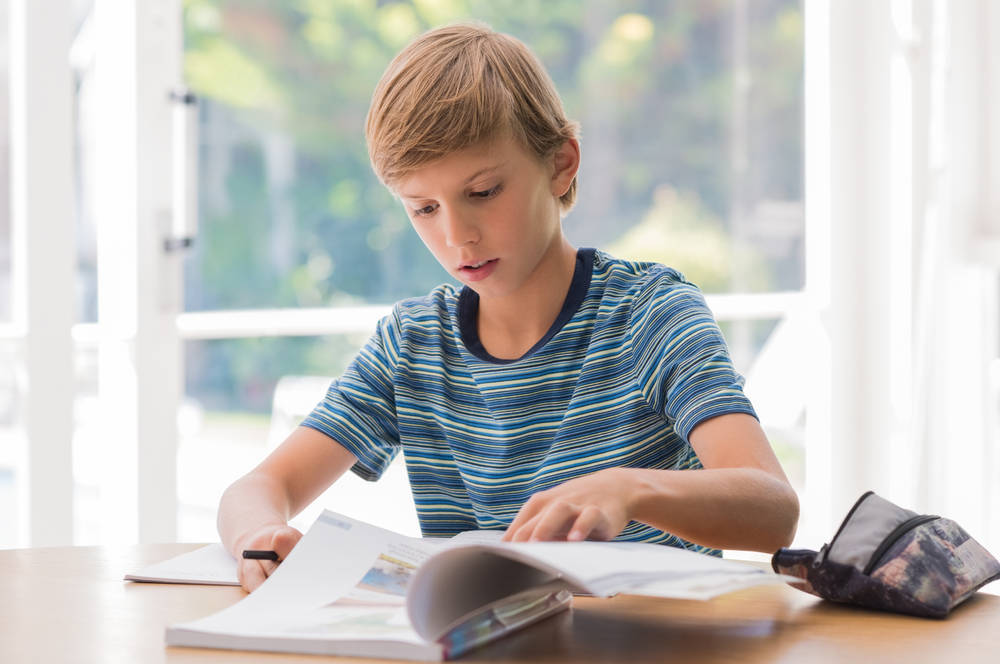At a glance
· 3. Repeat instructions to increase the learner’s likelihood of comprehension. 4. Make sure the learner has learned the ideas presented at school. Homework should be a form of practice for what has been learned at school. 5. Get the learner to create a specific time each evening to work on homework tasks. 6 Try these three unusual-sounding but effective strategies: Spaced repetition Typically a teacher presents an entire lesson, students take notes and complete class work, and then they do homework to reinforce learning. Once the lesson is over, the student may not need the information again until an exam · Help your child focus on his homework tasks by eliminating all distractions during homework time. This includes the television, video games, electronic devices of all kinds and cell phones. Some families find that establishing a “quiet” rule for an hour or two during homework sessions makes the environment more conducive to productivity

Secondary navigation
· Help your child focus on his homework tasks by eliminating all distractions during homework time. This includes the television, video games, electronic devices of all kinds and cell phones. Some families find that establishing a “quiet” rule for an hour or two during homework sessions makes the environment more conducive to productivity Try these three unusual-sounding but effective strategies: Spaced repetition Typically a teacher presents an entire lesson, students take notes and complete class work, and then they do homework to reinforce learning. Once the lesson is over, the student may not need the information again until an exam · Set up a homework-friendly area. Make sure kids have a well-lit place to complete homework. Keep supplies — paper, pencils, glue, scissors — within reach. Schedule a regular study time. Some kids work best in the afternoon, following a snack and play period; others may prefer to wait until after dinner. Help them make a plan

Main navigation
Three educators share their best ideas for keeping students informed, interested, and on task. Plus links to a handful of school homework policies. Homework Study Hall: Mandatory "Make Up" for Missed Work Startled by the number of failing grades his students were receiving, principal David Chambers made making up missed work a mandatory activity · The main objective of this research is to analyze how homework assignment strategies in schools affect students' academic performance and the differences in students' time spent on homework. Participants were a representative sample of Spanish adolescents (N = 26,) with a mean age of (±), % blogger.com: Rubén Fernández-Alonso, Marcos Álvarez-Díaz, Javier Suárez-Álvarez, José Muñiz · Help your child focus on his homework tasks by eliminating all distractions during homework time. This includes the television, video games, electronic devices of all kinds and cell phones. Some families find that establishing a “quiet” rule for an hour or two during homework sessions makes the environment more conducive to productivity

More on this topic for:
This article describes five strategies that researchers have identified that help students with disabilities get the most from their homework. They include: Give clear and appropriate assignments Make homework accommodations Teach study skills Use a homework calendar Ensure clear home/school communication Strategy blogger.comted Reading Time: 7 mins · Set up a homework-friendly area. Make sure kids have a well-lit place to complete homework. Keep supplies — paper, pencils, glue, scissors — within reach. Schedule a regular study time. Some kids work best in the afternoon, following a snack and play period; others may prefer to wait until after dinner. Help them make a plan Three educators share their best ideas for keeping students informed, interested, and on task. Plus links to a handful of school homework policies. Homework Study Hall: Mandatory "Make Up" for Missed Work Startled by the number of failing grades his students were receiving, principal David Chambers made making up missed work a mandatory activity

The challenge: Rushing through homework
· Set up a homework-friendly area. Make sure kids have a well-lit place to complete homework. Keep supplies — paper, pencils, glue, scissors — within reach. Schedule a regular study time. Some kids work best in the afternoon, following a snack and play period; others may prefer to wait until after dinner. Help them make a plan In short, students should be given homework to preview new content, deepen knowledge of new content, or practice a process or skill (Marzano, ). For example, give each student a paper lunch bag and ask them to bring the bags back the next day filled with three things that represent something meaningful in their lives Try these three unusual-sounding but effective strategies: Spaced repetition Typically a teacher presents an entire lesson, students take notes and complete class work, and then they do homework to reinforce learning. Once the lesson is over, the student may not need the information again until an exam
No comments:
Post a Comment